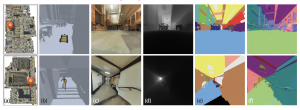The Gibson project, by Stanford University AI Lab uses PyBullet:

Perception and being active (i.e. having a certain level of motion freedom) are closely tied. Learning active perception and sensorimotor control in the physical world is cumbersome as existing algorithms are too slow to efficiently learn in real-time and robots are fragile and costly. This has given rise to learning in simulation which consequently casts a question on transferring to real-world. In this paper, we study learning perception for active agents in real-world, propose a virtual environment for this purpose, and demonstrate complex learned locomotion abilities. The primary characteristics of the learning environments, which transfer into the trained agents, are I) being from the real-world and reflecting its semantic complexity, II) having a mechanism to ensure no need to further domain adaptation prior to deployment of results in real-world, III) embodiment of the agent and making it subject to constraints of space and physics.
